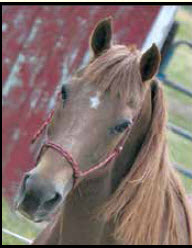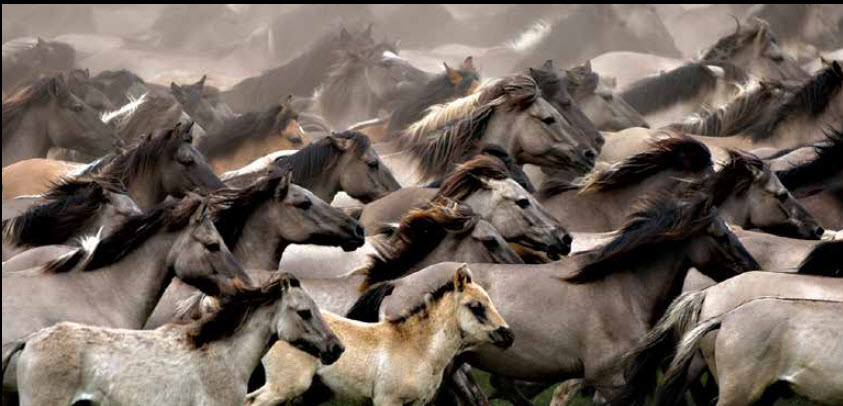Horse Whispering – Herd Mentality
 By: Deb Kitchenmaster
By: Deb Kitchenmaster
Have you heard the term ‘herd mentality’? Interestingly enough there is a herd mentality among horses, and there is a herd mentality among humans. Let’s take a look into this type of mentality in these two areas, starting with horses.
Because the horse is a social or herd animal and finds safety in numbers, almost all horses are herd-bound. Next to the instinct to survive, this strong social behavior is number two in importance to the horse. The herd is EVERYTHING. Horses touch heads with each other, signifying, “You are part of the herd, along with me.” Horses have a trust in the herd. Being within the herd is ‘a no-fear environment.’ The herd gives the horse security. Alive in the herd is this incredible thing called a pecking order. Unlike the world of man where pride or ego yells, “Pick me, pick me!” the pecking order within the environment of the horse is about strength, keenness and experience.

Helpful in building a healthy relationship with your horse is to understand the nature, the structure, and the importance of herd mentality. Let’s talk about the herd of two. That would be you and your horse. There is one leader and there is one follower. If you are not the leader, guess what? You are the follower! Experiencing possibly millions of years of herd instinct, the horse picks up very quickly where you are in the pecking order. The desired outcome is that the horse will easily accept your role as the leader. As a conscious leader, you will make choices that build trust between you and your horse, not squelch it. For example, if you are a handler that works through force, pain, or fear, the horse will never look to you as his leader. He will see you as a predator! A handler, whose focus and motive is to develop trust between them and their horse will see the beauty of a horse relaxing to the point where the horse is free to learn. What a beauty to behold when the handler is the leader of the herd! Your PRESENCE rings loud and clear ASSURANCE that you are part of the herd.

Human ‘herd mentality’ (aka mob mentality) describes how people can be influenced by their peers to adopt certain behaviors on a largely emotional, rather than rational, basis. When individuals are affected by herd mentality they may make different decisions than they would have individually. Herd mentality among humans describes a behavior in which people act the same way or adopt similar behaviors as the people around them – often ignoring their own feelings in the process. Some studies concluded that we experience the same emotions as the people around us. Here are five thoughts in safeguarding yourself from herd mentality. (1) Stop being on auto-pilot. What does that mean? Hit the ‘Pause’ button and consider your options. Instead of copying the behavior of people you see around you, make more decisions for yourself. (2) Make a conscious effort to form your own opinion. Rather than adopt the herd mentality, educate yourself about your choices so you can make a well-informed decision. (3)Take time to make decisions. Take time in making decisions by asking questions and thinking about your options – even if that means you risk looking stupid or holding up the line. Just because everyone else seems to be making a quick decision doesn’t mean they know best. (4) Be AWARE of ways in which stress affects your decision making. If you are stressed about something going on in your personal life, you’re at greater risk of being a copycat. Recognize that risk, and when possible, put off decision making until you can concentrate on the task at hand. (5) Be willing to stand out. We are more likely to copy other people when we lack social acceptance. Be willing to stand out and dare to do things differently.
Herd mentality goes to my dear horse friend, Audrey, whose birthday is Monday, August 19. I love how you love animals! HAPPY BIRTHDAY, BELOVED!
Herd mentality goes to my younger brother of nine years, Ron, whose birthday is Thursday, August 22. I love you so. I enjoy listening, laughing, and learning (technology) from you.
